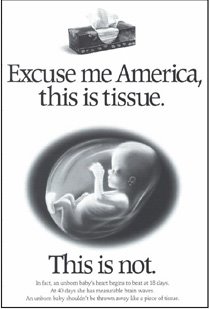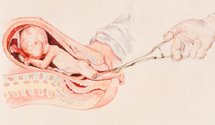The Ultimate Woman's Right's Conundrum: Sex-Selective Abortion
 From the latest United Families Newsletter.
From the latest United Families Newsletter."For many...even those who are pro-choice, the matter may not appear quite so simple. Two norms in the
Sherry Colb,
Dear Friends of the Family,
Welcome to the 21st century. Marvels and conveniences brought on by science and technology have removed the drudgery of every day life and made work more efficient and even enjoyable.
As we have learned through the ages, technology and scientific advances can be used for good or for bad purposes. This is the case when it comes to ultrasound machines, and other newer technologies that reveal the sex of an unborn child. Who would have imagined technology developed to diagnose illness and save lives would evolve into a vehicle to help extinguish life because it did not suit another person's wishes? With this knowledge, one must ask how a culture that values gender over life itself can expect to one day value anything.
Social and political scientists concerned about sex ratios of nations
Sex-selective abortion is defined as the practice of purposely seeking out the gender of an unborn child and aborting it based on its gender. Cultural norms, such as those in
A 1996 study conducted by a Chinese researcher claimed that 85% of aborted fetuses in
Unintended consequences bring violence to the world
The United Nations reports that 7,000 girls daily are the victims of sex selective abortions in
A book by Professors Valerie M. Hudson and Andrea M. der Boer, called Bare Branches: Security Implications of Asia's Surplus Male Population, warns that war brought on by
Other unintended consequences from female infanticide and the imbalance of male and female ratios include rape, sex trafficking and prostitution, increased crime, societal unrest and obstruction to the development of democracy and prosperity.
Even though
Designer families
Sex-selective abortion is frequently performed for non-medical reasons that do not threaten the life of the mother. Some families opt for it simply to balance the gender of their children; others are utilizing today's technology to "design" their own families. Geneticists, ethicists, pro-life and pro-family experts are alarmed over the potential harm this practice will have to children, families and society as a whole.
Marcy Darnovsky, associate executive director for the Council for Responsible Genetics and author of, Revisiting Sex Selection: the Growing Popularity of New Sex Selection Methods Revives an Old Debate states:
This constellation of technological, economic, cultural, and ideological developments has revived the issue of sex selection, relatively dormant for more than a decade...These include the prospect that selection could reinforce misogyny, sexism, and gender stereotypes; undermine the well-being of children by treating them as commodities and subjecting them to excessive parental expectations or disappointment; skew sex ratios in local populations; further the commercialization of reproduction; and open the door to a high-tech consumer eugenics.
A British company called DNA Worldwide is currently selling a mail order kit that determines the sex of unborn children as early as six weeks into a pregnancy. The company sells worldwide over the Internet, except to
Stopping the madness
Countries like
In
This past March at the United Nations Commission on the Status of Women (CSW), in
Nevertheless, the CSW did address the practice of female infanticide. Included in its "Agreed Conclusions on the Elimination of all Forms of Discrimination and Violence against the Girl Child" was this entry:
14.9. Violence and discrimination:
h. Eliminate all forms of discrimination against the girl child and the root causes of son preference, which results in harmful and unethical practices regarding female infanticide and prenatal sex selection, which may have significant repercussions on society as a whole;...
Working together to rid the world of "bad reasons"
Just as UFI found some nations at the CSW/United Nations conference opposed to a resolution decrying sex-selective abortion, some pro-choice groups and individuals may stand by their belief that a woman has the right to terminate a pregnancy for any reason - at any time. This position will undoubtedly be controversial as the technological consequences of this crime against nature and women continues to come to light.
Warmly,
Carol Soelberg, President
United Families International
Labels: sex-selective abortion


























0 Comments:
Post a Comment
<< Home